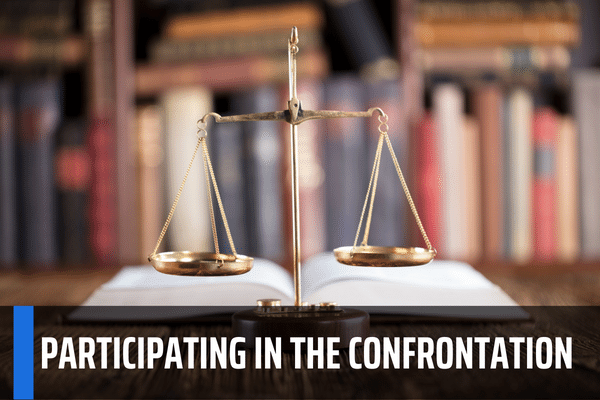Can a Vietnamese aged below 18 refuse to participate in the confrontation? What are the regulations on written records of confrontation?
- Vietnam: If testimonies from two or several persons come into conflict despite various investigative measures implemented, what should the investigators do?
- What are the regulations on written records of confrontation in Vietnam?
- Can a Vietnamese aged below 18 refuse to participate in the confrontation?
Vietnam: If testimonies from two or several persons come into conflict despite various investigative measures implemented, what should the investigators do?
According to Article 189 of the Criminal Procedure Code 2015, the confrontation is as follows:
- If testimonies from two or several persons come into conflict despite various investigative measures implemented, investigators shall conduct a confrontation. Investigators, before carrying out a confrontation, must inform the equivalent Procuracy to assign procurators administering the confrontation. Procurators must be present to administer the confrontation. The procurators' absence shall be clearly described in the written record of confrontation.
- Investigators must explain liabilities against witness testifiers or crime victims refusing, avoiding or falsifying depositions, prior to their participation in a confrontation. Such process shall be recorded in writing.
- Investigators, at the beginning of the confrontation, shall inquire into the mutual relationship of attendees before asking about facts to be clarified. Investigators, after listening to the confrontation, may raise additional questions to each attendee.
Investigators, during the confrontation, can present relevant evidences, documents and items. Attendees may question each other. Their questions and answers shall be reduced to writing.
Attendees’ previous statements shall be restated only after the attendees in the confrontation complete their depositions.
- The written record of confrontation is made according to Article 178 of this Law. The confrontation may be recorded by sound or sound-and-visual means.
- Procurators, if necessary, may organize the confrontation. Confrontation shall be governed by this Article.
Thus, If testimonies from two or several persons come into conflict despite various investigative measures implemented, investigators shall conduct a confrontation. Investigators, before carrying out a confrontation, must inform the equivalent Procuracy to assign procurators administering the confrontation. Procurators must be present to administer the confrontation. The procurators' absence shall be clearly described in the written record of confrontation.
What are the regulations on written records of confrontation in Vietnam?
In Clause 4, Article 189 and Article 178 of the Criminal Procedure Code 2015, the investigation minutes are as follows:
Authorized procedural persons, when investigating, must execute their investigations in writing as per Article 133 of this Law.
Investigators and investigation officers, who make written records, must read out such records to the participants in legal proceedings and explain participants’ rights to add their notions and remarks about the records. Additional notions and remarks shall put into the records. If additional notions are rejected, reasons must be specified in the records. Participants in legal proceedings, investigators and investigation officers shall affix signatures onto the records.
If the records are made by procurators or checkers, such records shall be governed by this Article. The records shall be promptly sent to investigators who shall put them in case files.
The making of such records during the stage of charge shall be governed by this Article.

Participating in the confrontation
Can a Vietnamese aged below 18 refuse to participate in the confrontation?
Pursuant to Article 421 of the Criminal Procedure Code 2015, which provides for deposition of persons held in emergency custody, apprehended or temporarily detained, crime victims, witness testifiers; interrogation of suspects; confrontation as follows:
- When a person under 18 gives depositions while held in emergency custody or apprehended or temporarily detained, or suffers harms of crimes, or testify, or is interrogated, the competent procedural authorities must inform the defense counsel, representative and protector of such person’s legitimate rights and benefits of the time and location of the deposition or interrogation in advance.
- The defense counsel or representative must be present during the taking of depositions from person held in emergency custody, apprehended or temporarily detained or during the interrogation of suspects.
The representative or protector of legitimate rights and benefits of crime victims or witness testifiers must attend the deposition of such persons.
- The defense counsel and representative can pose questions, with the consent of the investigators or procurators, to the persons apprehended and detained or suspects under the age of 18. After competent individuals end each session of despotion or interrogation, the defense counsel and representative can raise questions to the suspects or persons held in emergency custody, apprehended or held in termporary custody.
- There shall be at most, on daily basis, two sessions of deposition of persons under 18. Each session shall be less than 02 hours, unless the case comprises a variety of complex factors.
- Only two sessions of interrogation of suspects under 18 shall be permissible per day. The duration of each session shall be limited to 02 hours, except for:
+ Organized crimes;
+ Seeking of fugitive criminals;
+ Prevention of crimes;
+ Search of tools or instruments of crime or other exhibits related to the case;
+ Cases with several complex facts.
- Authorized procedural persons shall have suspects or defendants confronted with crime victims aged below 18 for the sole purpose of elucidating facts of the case if the case cannot be solved without confrontation.
Accordingly, persons under the age of 18 have the right to refuse to participate in the confrontation, however, authorized procedural persons shall have suspects or defendants confronted with crime victims aged below 18 for the sole purpose of elucidating facts of the case if the case cannot be solved without confrontation.
LawNet
